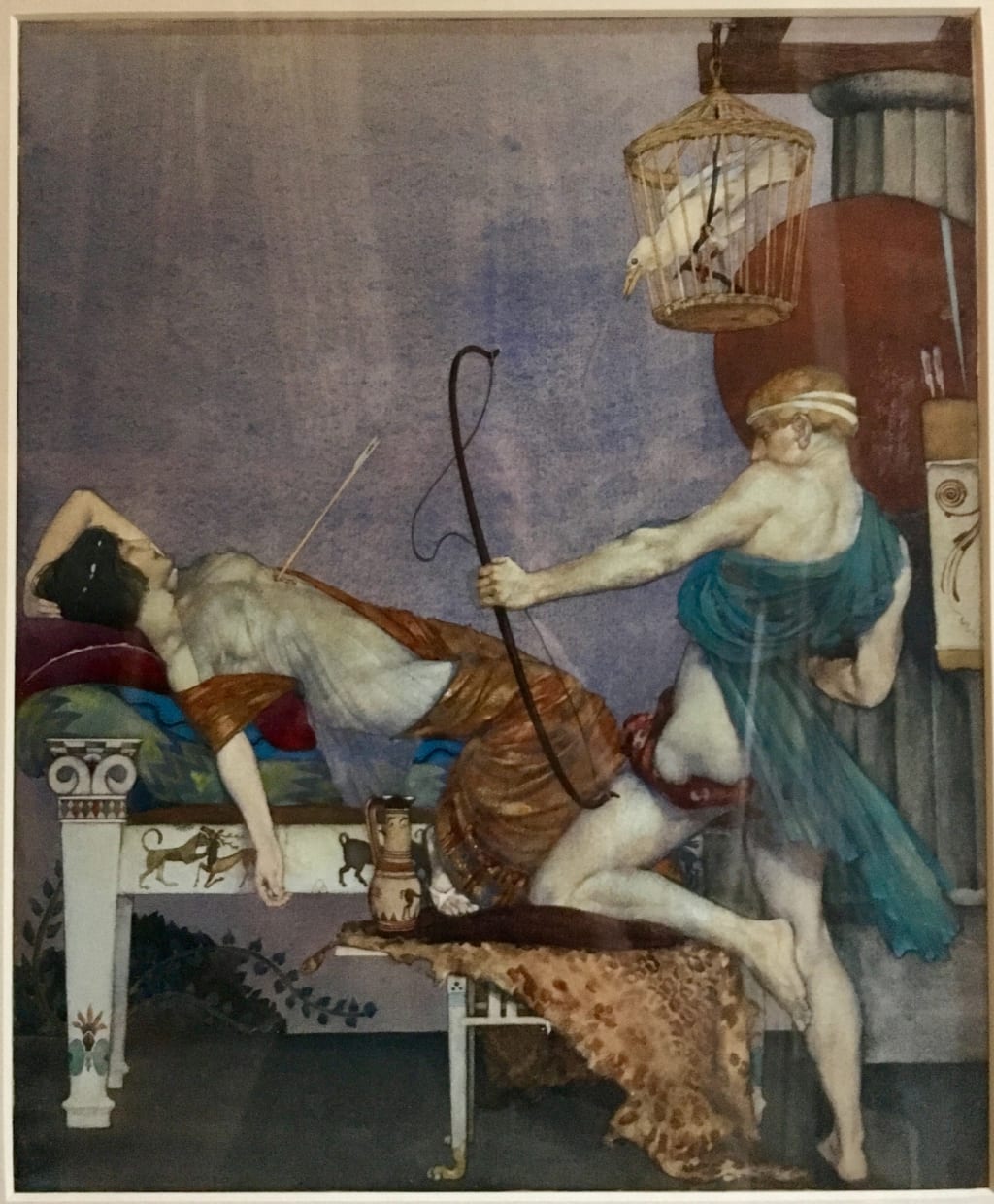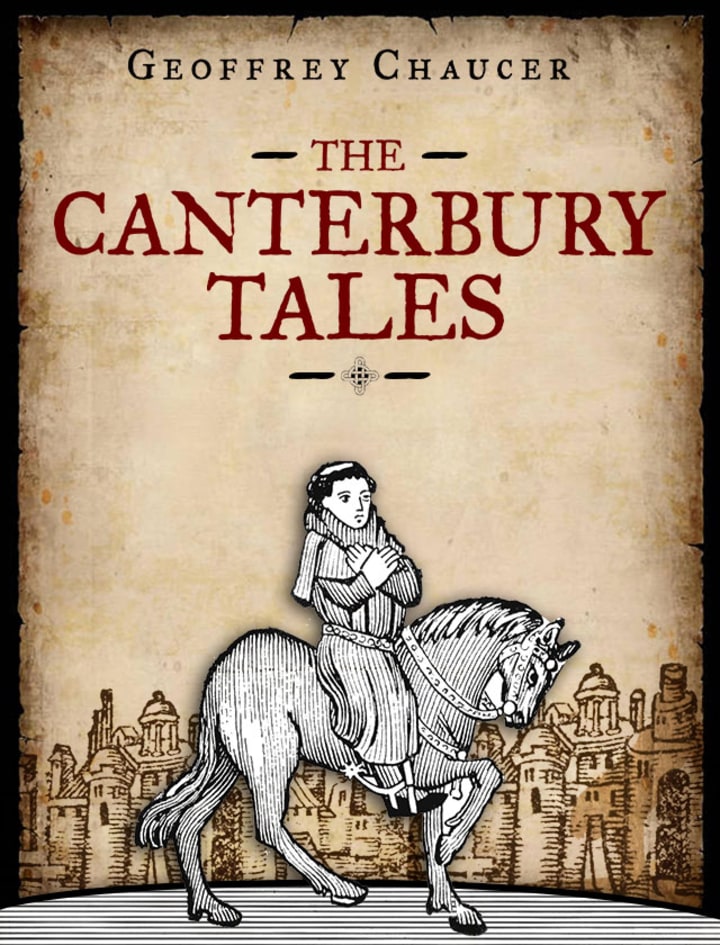The Manciple's Tale, by Geoffrey Chaucer
One of the shortest Canterbury Tales

A medieval manciple was in effect the quartermaster of an Inn of Court, responsible for buying and looking after the food supplies for the lawyers who lived and worked there. Chaucer’s Manciple looks after the needs of more than thirty men “that weren of lawe expert and curious”, but when it comes to doing deals over the price of food, he “sette hir aller cappe”; in other words, he was the real brains of the place.
The Manciple’s Prologue and Tale form a manuscript fragment of their own, so there is some doubt about where Chaucer intended the Tale to appear in his general scheme of things. We know that the setting is quite close to Canterbury (near the delightfully named village of “Bobbe-up-and-doun”) so it may have been destined to be told either near the end of the outward journey or the start of the return.
The conversation in the Prologue concerns the Cook, who has been lagging behind and falling asleep on his horse. The Host calls on him to tell a tale, although he has already told one (we only have a fragment of it, but within the context of the Canterbury Tales we have to assume that the pilgrims would have heard a full tale from him). The Manciple points out that the Cook is drunk, despite this being early in the morning, and that his breath stinks. The Cook promptly falls from his horse and has to be helped back on.
The host begs the Manciple not to be so insulting to the Cook, pointing out that, when sober, he might well repay the Manciple in like measure. The Manciple proposes to tell a tale in the Cook’s place, and even offers him another drink!

The Tale
The Manciple’s Tale is that of the Tell-tale Bird, a story that had already appeared in many forms in ancient and medieval literature, both eastern and western. Chaucer’s version owes most to the Roman poet Ovid’s “Metamorphoses”, considerably augmented with description, illustrative exempla and other digressions, despite still being only about 250 lines long and one of the shortest of the completed tales. The tone of the Tale is formal and somewhat pedantic, which suggests that it is an early composition of Chaucer’s, and not written originally with any of the pilgrims in mind.
Phoebus the sun god, also the god of poetry and the arts, lives on Earth as a young man, an expert bowman and a “lusty bachiler” given to singing and “mynstralcie”. He keeps a crow with white plumage which he has taught to speak, and which can also sing. Phoebus has a wife whom he guards out of jealousy, despite treating her well in all other respects. The Manciple makes the connection between the wife and the crow, pointing out that keeping a bird in a gilded cage is all very well, but its chief desire will always be to escape. In case the point has not sunk in, the Manciple also says that the same principle applies to cats and wolves in equal measure.
The wife therefore takes a lover, whom she invites to the house when Phoebus is away. The adultery is, however, witnessed by the caged crow, who tells Phoebus all about it. In his anger, Phoebus kills his wife with an arrow, after which he breaks his bow and his musical instruments. In his despair he then turns on the crow, whom he accuses of having told a falsehood against a guiltless woman, as well as blaming himself for his jealousy.
The crow’s punishment is to be turned black, by having his white feathers pulled out, to lose the power of speech, and also his beautiful singing voice, being reduced to an ugly “caw”. Hence, crows today are black and cannot sing sweetly like other birds.
The Manciple expounds the moral of the Tale, which is that it is good to be careful what you say. In particular, one should not tell a husband that his wife has been untrue to him, because “A wikked tonge is worse than a feend”. It is better to keep quiet and keep your friends. Indeed, the Manciple goes on at some length in advising his hearers not to say too much! He ends with the line, “Kepe wel thy tonge, and thenk upon the crowe”.
Discussion
This is a rather sad tale as the last-but-one of the collection; indeed, given that the final tale is the Parson’s interminable sermon, this is the final contribution that can really be called a tale. Perhaps there is a joke here in that the Manciple urges everyone not to say too much and the Parson promptly gives them a thousand lines of dense prose!
It is a tale the message of which is, “don’t tell tales”, which sounds strange given the whole “raison d’etre” of the Canterbury Tales. It is also an arguable moral, in that the Manciple thinks it best to keep unwelcome news to oneself and let a wronged person stay in ignorance of the truth and continue to live a lie. There is more than one way of looking at this dilemma.
However, the message is also confused by the second cause of Phoebus’s anger, which is his jealousy. That is what is at the heart of his anger, and had he not been so jealous it could be argued that what the crow said would not have had such fatal consequences. Phoebus bitterly repents of his deed immediately after it is committed, and refuses to believe the truth of what he has been told. Take away the jealousy, and we can imagine that his disbelief would have expressed itself before his angry violence and not the other way round.
As is the case with several other Canterbury Tales, there are problems here with “continuity” caused by the unfinished and unedited nature of the collection. It seems clear enough that the conversation between the Host and the Cook, that leads to the Manciple telling his Tale, takes place in the morning. The Host asks the Cook what he has been doing all night, for example. However, the Parson’s Prologue starts by commenting that the Manciple has just finished his Tale, but that the sun is descending and the time is around four o’clock. As mentioned above, the Manciple’s Tale is very short, and certainly would not have taken all day to tell! Something is awry here, surely!
About the Creator
John Welford
I am a retired librarian, having spent most of my career in academic and industrial libraries.
I write on a number of subjects and also write stories as a member of the "Hinckley Scribblers".






Comments
There are no comments for this story
Be the first to respond and start the conversation.